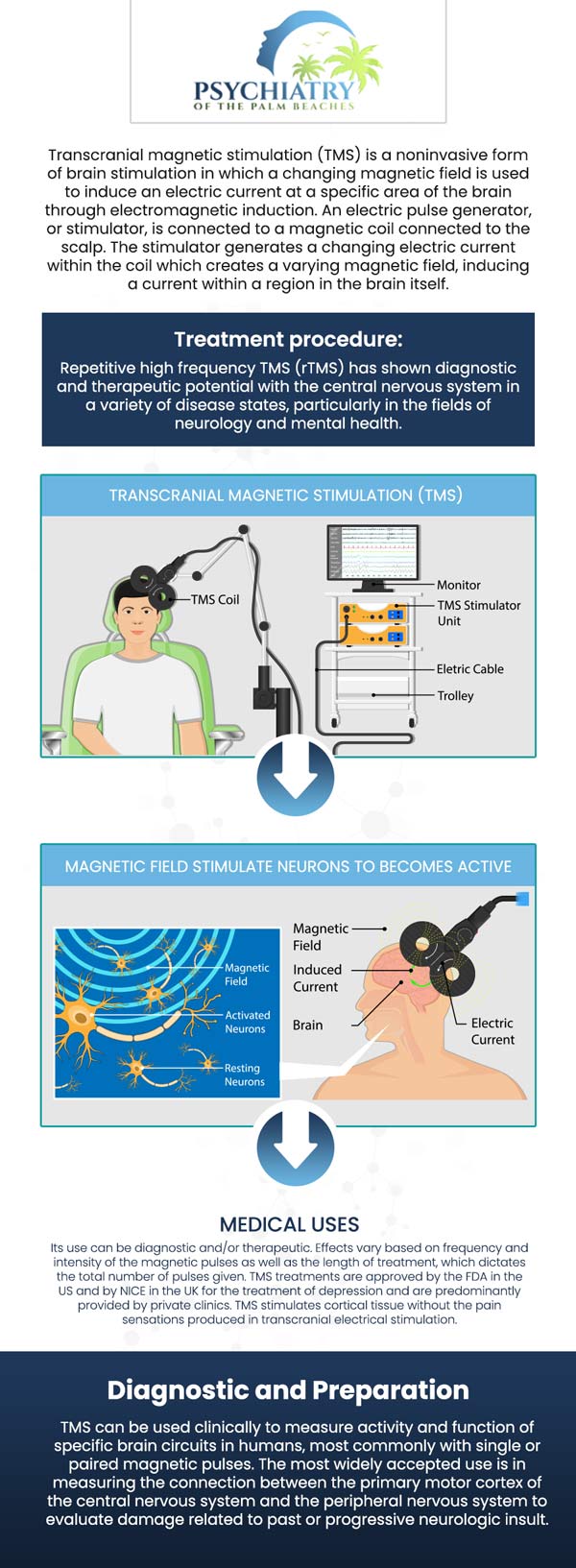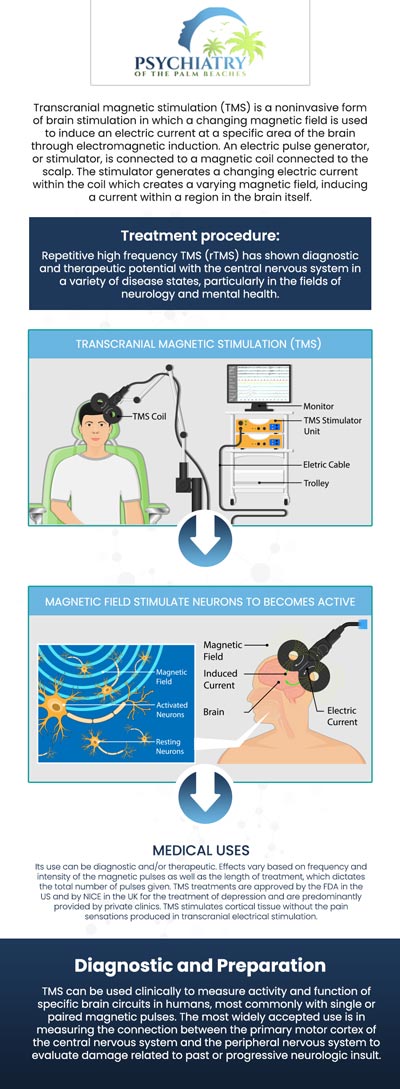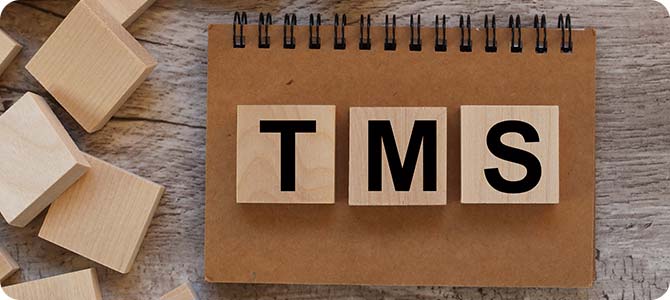Deep TMS (Deep Transcranial Magnetic Stimulation) Therapy Q&A
Deep TMS has a wide range of benefits, including its non-invasiveness, lack of significant side effects, and the ability to target and stimulate specific areas of the brain associated with mood and other mental processes. Learn more about the benefits of Deep TMS Therapy today! TMS therapy is available at Psychiatry of the Palm Beaches. For more information, contact us or book an appointment online. Visit Psychiatry of the Palm Beaches serving Jacksonville, Boynton Beach, Palm Beach Gardens, Stuart, Royal Palm Beach, Port St. Lucie, Melbourne, Fort Lauderdale, and Jupiter, FL.




Table of Contents:
What is deep TMS treatment?
What is the difference between TMS and deep TMS?
What is the success rate of Deep TMS therapy?
Does Deep TMS really work?
How long does Deep TMS last?
Deep TMS treatment, also known as deep transcranial magnetic stimulation, is a non-invasive brain stimulation technique used to treat a range of mental health conditions such as depression, anxiety, and obsessive-compulsive disorder.
Unlike traditional TMS, which uses a small magnetic coil placed on the scalp to stimulate brain cells, deep TMS uses an H-Coil that can penetrate deeper into the brain to reach the prefrontal cortex, an area associated with regulating mood, behavior, and thought processes.
During the treatment, the patient sits in a chair while the H-Coil is placed over the prefrontal cortex, and a series of magnetic pulses are delivered. The procedure takes about 20-30 minutes, and patients usually receive several sessions per week for several weeks.
The main difference between traditional TMS and deep TMS is the depth of the magnetic field penetration. While traditional TMS only targets the outer layer of the brain, deep TMS can reach deeper regions, such as the prefrontal cortex.
This allows deep TMS to target specific brain areas more precisely, making it a potentially more effective treatment for certain conditions. Additionally, traditional TMS requires patients to have a shaved head to ensure that the magnetic coil sits directly on the scalp, while deep TMS can be used with hair intact.
The success rate of TMS therapy varies depending on the condition being treated and the individual receiving treatment. TMS has been shown to be an effective treatment option for depression, with studies showing a response rate of around 50-60%. Response rates for other conditions, such as anxiety and OCD, are less clear, as there is less research on the use of TMS for these conditions.
Overall, Deep TMS is considered a safe and well-tolerated treatment option for mental health disorders, with few side effects. However, as with any treatment, there is a risk of adverse effects, such as headaches or discomfort at the stimulation site.
Deep TMS therapy has been shown to be effective for many individuals with depression and other mental health conditions. Studies have shown that TMS is effective in reducing symptoms of depression and improving the quality of life for many individuals.
However, it is important to note that TMS may not work for everyone, and it is not a cure for mental health disorders. Some individuals may require multiple courses of TMS therapy, while others may not respond at all. It is important for individuals to work closely with their healthcare providers to determine if TMS is the right treatment option for them and to closely monitor their symptoms throughout treatment.
TMS has a wide range of benefits including its non-invasiveness, lack of significant side effects, and the ability to specifically target and stimulate specific areas of the brain associated with mood and other mental processes. Additionally, TMS can be administered in an outpatient setting and does not require any sedation or anesthesia, making it a convenient and accessible treatment option for many patients.
The length of TMS treatment can vary depending on the individual and the condition being treated. In general, TMS treatment involves several sessions per week for several weeks, with each session lasting around 20-30 minutes.
The total number of sessions required varies depending on the individual patient’s response to the treatment, with some patients requiring as few as 20 sessions, while others may require up to 30 or more. Once a patient has completed a full course of Deep TMS treatment, they may continue to experience the benefits of the treatment for several months, with some studies suggesting that the effects can last up to a year or more.
However, the duration of the effects of TMS can vary depending on the individual and the condition being treated. It’s important to work closely with a healthcare professional to determine the optimal treatment plan for each individual patient.
Our Team’s Expertise in Deep TMS Treatment
Deep TMS therapy at Psychiatry of the Palm Beaches, led by our team, gives patients a powerful alternative when medications and traditional therapies are not enough. His patient-centered approach ensures each treatment plan is tailored, safe, and optimized to stimulate areas of the brain responsible for mood regulation.
TMS therapy is available at Psychiatry of the Palm Beaches. For more information, contact us or book an appointment online. We have convenient locations to serve you. We serve patients from Boynton Beach FL, Delray Beach FL, Palm Beach Gardens FL, Jupiter FL, Stuart FL, Palm City FL, Royal Palm Beach FL, Wellington FL, Citrus Ridge FL, Jacksonville FL, Riverside FL, Port St. Lucie FL, Beau Rivage West FL, Melbourne FL, Palm Bay FL, Fort Lauderdale FL, Hollywood FL, Jupiter FL, North Palm Beach FL, and surrounding areas.
Check Out Our 5 Star Reviews



Additional Services You May Need
▸ Mental Wellness
▸ Relationship Coaching
▸ Depression and Mood Disorders
▸ Women’s Health
▸ Panic Disorder
▸ Medications Management
▸ Men’s Health
▸ Individual Psychotherapy
▸ Bipolar
▸ ADHD
▸ Geriatric Mental Health
▸ Couple’s Counseling
▸ Obsessive Compulsive Disorder
▸ Social Phobia Treatment
▸ Eating Disorders
▸ Post Traumatic Stress Disorder
▸ Psychotic Disorders


